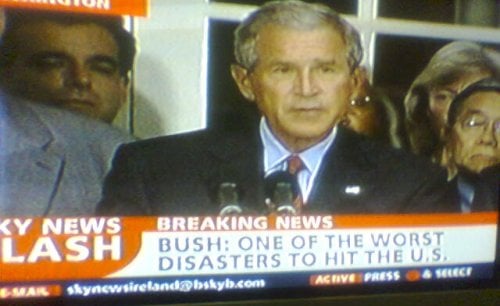Guardian Unlimited | Special reports | To say we must stay in Iraq to save it from chaos is a lie: "Iraq is a fiasco without parallel in recent British policy."
says Simon Jenkins in today's grauniad
also Ian mcWhirter in The Herald
Face it. It’s time we got our army out of Blair’s Vietnam (copy below) and a host of others...
Face it. It’s time we got our army out of Blair’s VietnamIain Macwhirter
The Herald
September 21 2005
Regular readers of this column know that it is not given to gloating at the misfortunes of Messrs Bush and Blair. Heaven forfend. So it gives me no satisfaction whatever that the tide of opinion on Iraq is moving rapidly towards the "troops out" line that has long been advocated in this space.
Until now, such a posture has been regarded as irresponsible, defeatist, unpatriotic. Not any more. Suddenly everyone is talking about when and how we get out of this quagmire. All three main opposition leaders are calling for it explicitly or in terms, by demanding an exit strategy following the latest disturbances in Basra.
Even that redoubtable old war-horse, Max Hastings, the man who beat the Army into Port Stanley in 1982, says he was wrong about keeping the troops in Iraq "until the job is done". "We are waist-deep in the big Muddy", the former Telegraph editor concluded in a newspaper article yesterday. "The only sensible thing is to strike for the shore."
Hastings's decision to swim for it is less to do with ending the suffering of the poor Iraqis, than with avoiding the imminent humiliation of the British Army. The sight of burning British uniforms tumbling out of armoured vehicles besieged by a Basra mob is causing something of a panic in the British military Establishment. Unlike the Americans, we don't do defeat. Certainly not at the hands of petrol-bombing "natives".
When we are reduced to driving tanks into the local police station in pursuit of British soldiers detained by the very Iraqi police force we helped to train, then it really is time to ask what we are doing here. There is widespread acceptance now that Iraq is heading inexorably toward civil war. British troops have no role to play in that civil war and should not be called upon to get in its way. This is not Belfast. The only way to keep our soldiers out of this fight is to take them out before they are taken out themselves. Yet, at the weekend, the government seemed to be talking about sending more troops to Iraq. This is madness.
Ninety-five British soldiers have already died in Iraq. When that figure tops 100, then our war aims will anyway have to be reviewed. You simply cannot allow soldiers to die in such numbers without any clear idea of what they are dying for. They don't even know who the enemy is in Iraq.
The Sunnis have long been hostile, but even the Shia Muslims seem to be losing patience at the British presence. The nationalist leader, Moqtada al Sadr's militants appear to have taken over sections of the local police. Many have detected Iranian involvement in the recent disturbances, which is intensely worrying.
From the start, this war has been conducted without any clear war aims, political objectives, civil contingency planning or exit strategy. We long ago stopped looking for WMD; we're certainly not defeating terrorism; the country is in ruins; and our continued military presence is a focus for instability.
Certainly, we should do our best to leave Iraq in as good order as possible. The last service we can do for the country is to try to ensure that the constitutional ballot on October 15 is as democratic as possible. But immediately thereafter we should announce a timetable for withdrawal. The last thing we want to see is the last British soldier being bundled into a helicopter as we escape in disarray from Basra, pursued by the crackle of AK 47s. We should never have been there in the first place. The best thing we can do now is remove ourselves with as much dignity as we can muster.
As Colonel Tim Collins put it at the weekend: "One cannot help but wonder what it was all about." This is the same Colonel Tim "Nails" Collins, commander of the First Battalion Royal Irish Regiment, who sent his men into battle in March 2003 with those stirring words about going to Iraq "to liberate, not to conquer". About being "ferocious in battle, but magnanimous in victory". About zipping up British dead "in their sleeping bags" and sending them back home. He now believes he was duped by the politicians: "I made certain assumptions that my goodwill and altruistic motivations went to the top. Clearly, I was naive." He goes on to demand and explanation of "where we are going, and why".
Like Max Hastings, Collins is expressing the view held by many in the British military who realise that Iraq has been a disaster and that things are going to get worse. His demand for an explanation of what we are doing there is thinly disguised code for saying that we shouldn't be there at all.
It is remarkable for a former field commander to deliver such a public condemnation of his commander-in-chief effectively, (if not constitutionally), Tony Blair. But it is more all the more extraordinary when the soldiers he sent into battle are still in there fighting and dying. These are the people everyone seems to forget about – the poor bloody infantry. Eying their sleeping bags with some apprehension as Iraq goes up in flames.
The idea that in some way the Brits had "sorted" the south is no longer sustainable. We cannot strike poses as the helmet-less liberators, patroling the streets with cockades high, when we are having to resort to heavy armour. There was always a dose of mythology about the conduct of the war in the British theatre. As we saw at Camp Breadbasket, we were almost as bad as the Americans when it came to mistreating the locals.
However, it was generally thought that Britain had gone further towards winning the "hearts and minds" (that awful phrase from the Vietnam era) than in the north where the Americans' idea of enlisting popular support is to raze towns like Falluja and kill everything in it that moves.
The British had also supposedly advanced the "Iraqi-isation" (another hateful Vietnam-era neologism), of the police and security forces. But as the New York Times journalist, Steven Vincent pointed out in a remarkable article two months ago, this had been at the cost of allowing Muslim extremists to infiltrate many police stations. He paid for that story with his life. Vincent was assassinated in Basra shortly after it was published.
It's time to face reality. When Sir Menzies Campbell, the deputy leader of the Liberal Democrats calls for a "strategy for withdrawal", and the Tory leader Michael Howard calls for "an honest assessment of the difficulties", they both insist they don't want to "cut and run". But sometimes cutting and running is all you have left.
As the Labour ex-spin doctor, Lance Price, makes clear in his memoirs, the prime minister rather likes the idea of being a war leader. He would take withdrawal as a personal defeat. Which of course it would be. However, British soldiers should not be required to give their lives in order to feed the vanity of an arrogant politician.
This is Blair's Vietnam, not theirs.
 Welcome
Welcome










